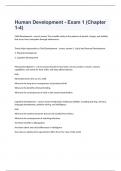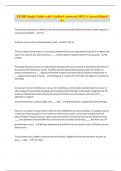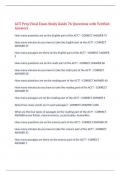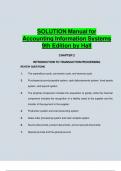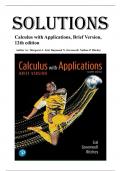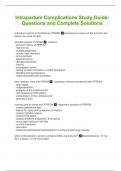Summary
Inhoudsopgave
School neuropsychology: Mind, Brain and Education - Summary....................................1
Week 1............................................................................................................................ 2
Chapter 5 school neuropsychology assessment models..............................................3
Chapter 14 attention and working memory facilitators/inhibitors................................6
Week 2............................................................................................................................ 9
Chapter 7 major school neuropsychological test batteries for children.....................10
Chapter 13 executive functions.................................................................................14
Article EF treatment and intervention in schools – Otero and al................................17
Article using physical activity to manage ADHD symptoms: the state of the evidence
– Hoza....................................................................................................................... 19
Week 3.......................................................................................................................... 20
Chapter 4 when to incorporate neuropsychological principles into a comprehensive
assessment............................................................................................................... 20
Article psychological heterogeneity in ADHD: a dual pathway model........................26
Article ADHD and academic performance: why does ADHD impact on academic
performance and what can be done to support ADHD children in the classroom?....28
Week 4.......................................................................................................................... 31
Article ADHD in the classroom: effective intervention strategies..............................31
Week 5.......................................................................................................................... 34
Chapter 10 sensorimotor functions...........................................................................35
Chapter 11 visuospatial and auditory cognitive processes........................................40
Chapter 12 learning and memory cognitive processes..............................................43
Week 6.......................................................................................................................... 47
Chapter 15 speed, fluency, and efficiency of processing facilitators/inhibitors..........51
Chapter 16 acquired knowledge: acculturation knowledge and language abilities....54
Chapter 17 acquired knowledge: academic achievement.........................................57
Week 7.......................................................................................................................... 61
Article Neurocognitive Consequences of Diabetes....................................................64
1
,Week 1
The patterns of strengths and weaknesses approach PWS to specific
learning disabilities SLD identification fueled interest in the underlying
neurocognitive constructs which are predictive of academic achievement.
Increased interest in SNP.
1. Recognition of neurobiological bases of childhood learning and
behavior disorders.
- 1950s: behaviorist approaches cannot explain complex mental
functions (language etc).
- Integrating neuropsychological principles got off a rough start, which
reinforce behaviorism.
- 1970s: start investigating neurobiological bases of learning
disabilities and behavior disorders.
2. Increased children with medical conditions affecting school
performance.
- Higher survival rate of very low bodyweight children (incr risk for
neurosensitive, cognitive, neuropsychological, behavioral, and
school/academic difficulties).
Early neurodevelopmental assessment is important for early
detection of LT neurological impairment/developmental delay
(but not always reliable!).
- Increase % children with (chronic) health conditions.
- Increase medication to control mood and behavior disorders in
children.
- Increase studies showing neuropsychological deficits associated with
asthma, diabetes, and heart disease.
- Limitations of clinical treatment for neurological disorders (autism) in
school-settings.
- People with TBI have challenges in school-settings.
3. Increase in educational and behavior problems in schools.
- Many of serious emotional disturbances have neurological etiology.
- Inaccurate diagnoses are given, resulting in inadequate care.
4. Increased emphasis on the identification of processing disorders in
SLD diagnosed children.
- School np’s must look why there is a learning delay, to rule out
visual, hearing, motor intellectual disabilities or contextual factors.
o SLD diagnosis is based on spoken and/or written language.
SNP identifies underlying neuro deficits, explain SLD’s.
Why is there a need for neuropsychological assessment at schools?
1. Limited access to SNP’s in and outside of school, while consultation
provides valuable information for parents and teachers.
2. Limited usefulness of some neurological reports.
2
, 3. Unique contribution of SNP assessment: includes more in-depth
assessment of individual neurocognitive constructs.
a. Identify processing deficits that could affect learning potential.
b. Describe a strength/weakness profile.
c. Document whether changes in learning or behavior are
associated with neurological disease, psychological conditions,
neurodevelopmental disorders, or non-neurological disorders.
d. Monitor educational progress.
e. Comprehensive assessment data increases the likelihood of
successful interventions.
Definition SNP:
Integrates neuropsychological and educational principles into the
assessment of and development of interventions for children.
Provides an optimal learning environment for every (special needs) child.
Facilitates learning and behaviour in school and family systems.
Tasks:
1. Neuropsychological assessment and interpretation for schools
2. Assist in interpreting neuropsychological findings form medial
services.
3. Integrate brain research in educational practice.
4. Provide educational interventions.
5. Act as a liaison between school and medical community.
6. Consult with curriculum specialists to approaches to better instruct
what’s know about brain-behaviour relationships.
7. Train educators/parents about neuropsychological factors related to
childhood disorders.
8. Engage in research to test efficacy of neuro-based interventions.
Chapter 5 school neuropsychology assessment models
Cognitive hypothesis testing CHT model, combines two approaches:
1. Individual psychoeducational assessment.
2. Intervention development and monitoring.
Know that assessing a child’s behavior is confined to the environment and
neuropsychological assessment constrains behavior.
Use behavior analysis to track intervention progress.
Importance of single-subject design.
Cognitive information is also relevant in constructing interventions.
3
, Key component: analysis of neurocognitive demands/solution strategies
required to perform a task.
Global deficit? -> formulate a hypothesized reason -> assess further.
Neurodevelopmental model NDM of evaluation and intervention
Translate neuropsychological information to enhance sensitivity and
specify of disability determination and directing interventions for positive
QOL outcomes.
- Framework to systematically examine all sensory, integrative, and
generative cognitive processes related to cognitive product
(academic achievement).
Lurian developmental periods
Blok 1: sensory 0-4 years.
Processing sets: sensory, perceptual, integrative.
Activities: visual, auditive, sensory-motor, attention.
Block 2: integrative 4-11 years.
Processing sets: basic skills, integrative, fluency.
Activities: playing, beginning school, basic skills
Block 3: generative 11-adult.
Processing sets: mastery, creativity, EF.
Activities: read, write to learn, math, innovation.
4


